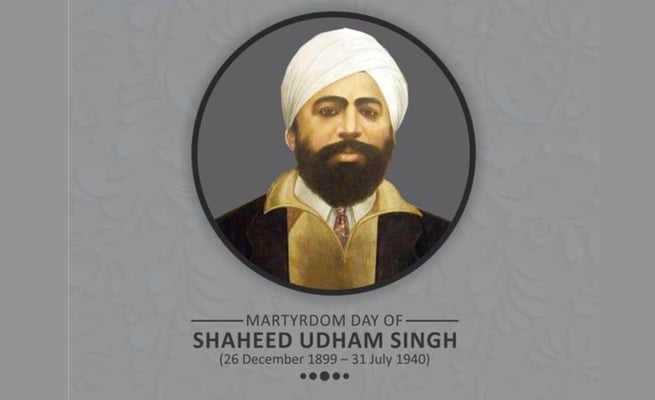Remembering Shaheed Udham Singh: The Avenger of Jallianwala Bagh Massacre

On this solemn day (July 31), we commemorate the death anniversary of Shaheed Udham Singh, a valiant revolutionary who avenged the horrifying Jallianwala Bagh Massacre of 1919.
Born as Sher Singh Kamboj on December 26, 1899, in Sunam, Punjab, Udham Singh's life was marked by tragedy from an early age. Losing his parents in 1901 and 1907, he and his elder brother, Mukta Singh, found refuge at the Central Khalsa Orphanage in Amritsar. There, their names were changed to Udham Singh and Sadhu Singh. Gifted with intelligence and artistic talent, Udham excelled in various arts and crafts, leaving an indelible mark on the hearts of those around him.
The years 1918 to 1919 witnessed growing unrest against British colonial rule. The ruthless recruitment of Indian soldiers during the First World War and their subsequent mistreatment awakened the spirit of resistance among the people. The arrest of prominent freedom fighters, Dr. Satyapal and Dr. Saifuddin Kitchlew, under the draconian Rowlatt Act further fueled discontent in Punjab.
The Jallianwala Bagh Massacre of April 13, 1919, remains one of the darkest chapters in India's struggle for independence. On that fateful day, General Reginald Edward Dyer's troops mercilessly opened fire on a peaceful gathering, killing and injuring thousands. The traumatic experience left an indelible scar on Udham Singh's soul, motivating him to seek vengeance and plunge into the path of revolution.
Udham Singh's journey as a revolutionary took him to East Africa in 1920, where he worked as a laborer on railway lines before traveling to the United States. There, he connected with the Ghadar Party, embracing their cause for India's freedom. Influenced deeply by the ideals of Bhagat Singh, he returned to Punjab in 1927, but constant police surveillance led to his arrest in Amritsar on August 30, 1927. Convicted and sentenced for possessing unlicensed weapons and a banned Ghadar Party newspaper, Udham Singh spent five years in Multan Jail.
During his time in confinement, he found solace in reading, keeping a copy of Waris Shah's Heer close to him, reciting its verses to those around him. Tragedy struck again in 1931 when he learned about the hanging of Bhagat Singh, Rajguru, and Sukhdev. This heart-wrenching news further strengthened his resolve to bring justice for the victims of the Jallianwala Bagh Massacre.
In 1931, General Dyer's death failed to quench Udham Singh's thirst for retribution. He set his sights on Michael O'Dwyer, the Lieutenant Governor of Punjab during the massacre, who vigorously defended Dyer's actions. Planning meticulously, he made his way to London in pursuit of his mission.
On March 13, 1940, Udham Singh's unwavering determination culminated in the Caxton Hall shooting. During a meeting, he strategically positioned himself, concealed a revolver in a specially cut book, and waited for the opportune moment. When Michael O'Dwyer took the stage, Udham Singh rose and fired all his bullets, holding O'Dwyer accountable for the atrocities at Jallianwala Bagh. The act resulted in O'Dwyer's death and injuries to others present.
Udham Singh did not flee the scene but stood his ground, raising slogans for India's freedom until his arrest. His trial began on April 1, 1940, during which he fearlessly proclaimed his intent and waited 21 years to avenge the massacre. Embracing the name Ram Mohamed Singh Azad, symbolizing Hindu-Muslim-Sikh unity in the fight for India's liberation, he refused to plead guilty.
During his incarceration at Brixton Prison, Udham Singh embarked on a 42-day hunger strike, enduring forcible feeding. The reasons behind his hunger strike remained shrouded in mystery, as the British authorities sought to suppress information about him.
Sadly, on July 31, 1940, Udham Singh was convicted of murder and sentenced to death. At 9 am on that fateful day, he was hanged at Pentonville Prison, laying down his life for the cause he believed in with unwavering devotion. His body found its resting place in a small burial ground among fellow prisoners.
Udham Singh's selfless sacrifice earned him the title of Shaheed-e-Azam Sardar Udham Singh. His actions continue to inspire generations of young Indians to resist oppression and strive for a free and independent India.
As we observe his death anniversary, let us remember the brave revolutionary who gave his life for the love of his country. Let us honor his memory by carrying forward his legacy of courage, dedication, and unwavering commitment to justice and freedom. Shaheed Udham Singh lives on in the hearts of all those who cherish the dream of a truly independent India.
On this solemn day (July 31), we commemorate the death anniversary of Shaheed Udham Singh, a valiant revolutionary who avenged the horrifying Jallianwala Bagh Massacre of 1919.
Born as Sher Singh Kamboj on December 26, 1899, in Sunam, Punjab, Udham Singh's life was marked by tragedy from an early...
On this solemn day (July 31), we commemorate the death anniversary of Shaheed Udham Singh, a valiant revolutionary who avenged the horrifying Jallianwala Bagh Massacre of 1919.
Born as Sher Singh Kamboj on December 26, 1899, in Sunam, Punjab, Udham Singh's life was marked by tragedy from an early age. Losing his parents in 1901 and 1907, he and his elder brother, Mukta Singh, found refuge at the Central Khalsa Orphanage in Amritsar. There, their names were changed to Udham Singh and Sadhu Singh. Gifted with intelligence and artistic talent, Udham excelled in various arts and crafts, leaving an indelible mark on the hearts of those around him.
The years 1918 to 1919 witnessed growing unrest against British colonial rule. The ruthless recruitment of Indian soldiers during the First World War and their subsequent mistreatment awakened the spirit of resistance among the people. The arrest of prominent freedom fighters, Dr. Satyapal and Dr. Saifuddin Kitchlew, under the draconian Rowlatt Act further fueled discontent in Punjab.
The Jallianwala Bagh Massacre of April 13, 1919, remains one of the darkest chapters in India's struggle for independence. On that fateful day, General Reginald Edward Dyer's troops mercilessly opened fire on a peaceful gathering, killing and injuring thousands. The traumatic experience left an indelible scar on Udham Singh's soul, motivating him to seek vengeance and plunge into the path of revolution.
Udham Singh's journey as a revolutionary took him to East Africa in 1920, where he worked as a laborer on railway lines before traveling to the United States. There, he connected with the Ghadar Party, embracing their cause for India's freedom. Influenced deeply by the ideals of Bhagat Singh, he returned to Punjab in 1927, but constant police surveillance led to his arrest in Amritsar on August 30, 1927. Convicted and sentenced for possessing unlicensed weapons and a banned Ghadar Party newspaper, Udham Singh spent five years in Multan Jail.
During his time in confinement, he found solace in reading, keeping a copy of Waris Shah's Heer close to him, reciting its verses to those around him. Tragedy struck again in 1931 when he learned about the hanging of Bhagat Singh, Rajguru, and Sukhdev. This heart-wrenching news further strengthened his resolve to bring justice for the victims of the Jallianwala Bagh Massacre.
In 1931, General Dyer's death failed to quench Udham Singh's thirst for retribution. He set his sights on Michael O'Dwyer, the Lieutenant Governor of Punjab during the massacre, who vigorously defended Dyer's actions. Planning meticulously, he made his way to London in pursuit of his mission.
On March 13, 1940, Udham Singh's unwavering determination culminated in the Caxton Hall shooting. During a meeting, he strategically positioned himself, concealed a revolver in a specially cut book, and waited for the opportune moment. When Michael O'Dwyer took the stage, Udham Singh rose and fired all his bullets, holding O'Dwyer accountable for the atrocities at Jallianwala Bagh. The act resulted in O'Dwyer's death and injuries to others present.
Udham Singh did not flee the scene but stood his ground, raising slogans for India's freedom until his arrest. His trial began on April 1, 1940, during which he fearlessly proclaimed his intent and waited 21 years to avenge the massacre. Embracing the name Ram Mohamed Singh Azad, symbolizing Hindu-Muslim-Sikh unity in the fight for India's liberation, he refused to plead guilty.
During his incarceration at Brixton Prison, Udham Singh embarked on a 42-day hunger strike, enduring forcible feeding. The reasons behind his hunger strike remained shrouded in mystery, as the British authorities sought to suppress information about him.
Sadly, on July 31, 1940, Udham Singh was convicted of murder and sentenced to death. At 9 am on that fateful day, he was hanged at Pentonville Prison, laying down his life for the cause he believed in with unwavering devotion. His body found its resting place in a small burial ground among fellow prisoners.
Udham Singh's selfless sacrifice earned him the title of Shaheed-e-Azam Sardar Udham Singh. His actions continue to inspire generations of young Indians to resist oppression and strive for a free and independent India.
As we observe his death anniversary, let us remember the brave revolutionary who gave his life for the love of his country. Let us honor his memory by carrying forward his legacy of courage, dedication, and unwavering commitment to justice and freedom. Shaheed Udham Singh lives on in the hearts of all those who cherish the dream of a truly independent India.









Leave a Comment